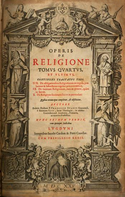| Part of the series on Modern scholasticism | |

| |
| Title page of the Operis de religione (1625) from Francisco Suárez. | |
| Background | |
|---|---|
|
Protestant Reformation | |
| Modern scholastics | |
|
Second scholasticism of the School of Salamanca | |
| Reactions within Christianity | |
|
The Jesuits against Jansenism | |
| Reactions within philosophy | |
|
Neologists against Lutherans | |
Ramism was a collection of theories on rhetoric, logic, and pedagogy based on the teachings of Petrus Ramus, a French academic, philosopher, and Huguenot convert, who was murdered during the St. Bartholomew's Day massacre in August 1572.[1]
According to British historian Jonathan Israel:
"[Ramism], despite its crudity, enjoyed vast popularity in late sixteenth-century Europe, and at the outset of the seventeenth, providing as it did a method of systematizing all branches of knowledge, emphasizing the relevance of theory to practical applications [...]"[2]
- ^ Chisholm, Hugh, ed. (1911). . Encyclopædia Britannica. Vol. 22 (11th ed.). Cambridge University Press. p. 881.
- ^ Israel, Jonathan (1995). The Dutch Republic: Its Rise, Greatness and Fall 1477–1806 (1995), p. 582.